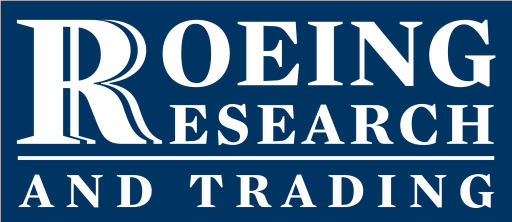Biography


Randall R. Roeing, CFA
The Early Days …
I began my career in the financial industry out of a deep respect for the father of a close friend, a modest man of steady demeanor and professional accomplishment. After acquiring my undergraduate degree from the University of Illinois, I first entered the financial industry as a retail broker. My path diverged from retail brokerage after a few years when I recognized my greater analytical, research interests. As I began trading stocks and commodities in the mid-1980s, it became readily apparent that there were no commercially-available tools to adequately support such activities. To further my abilities as a trader, I wrote my own database and computerized stock charting and trading programs with an excess of five thousand lines of code. As an indicator of the times, I remember making the tough decision to pay extra for the 40 MB hard drive on my first PC—what an extravagance!
In the late 1980s, I furthered my education by pursuing an MBA degree from DePaul University and my Chartered Financial Analyst (CFA) designation. I obtained both in 1991, a process that in many respects was the equivalent of completing two masters programs at once. I was motivated to complete both courses by an incredibly supportive wife who while working was also providing care for our first two children, both under the age of two.
During my years of study, I worked at Horizon Publishing, a marketer of financial newsletters and provider of managed accounts. I began writing for their newsletters and became the Manager of Research Services and Managing Editor during my tenure of a newsletter that is now known as Upside.
The newsletter was a bi-weekly publication that focused on the vast universe of low-priced stocks. It was produced during the pre-Internet days, prior to the luxury of on-line access to government filings and the myriad other resources one may take for granted today. Each newsletter featured a new stock recommendation along with reviews of existing recommendations and analysis of broad market trends.
When I began at Horizon, they didn’t have a single computer in use, so I brought mine from home. The company had begun publishing in 1946, and they still had access to an old print press where each letter was typeset individually. Eventually, bona-fide IT people were brought in such that by the time I left, Horizon was a fully-functioning, desktop publishing operation. As I have seen at Horizon, and so many times since then, the advancing digital age continues to have a profound impact on investment decisions. Though industry participants frequently identify technology as the root of chaos in the markets, disruption creates opportunity.
From my time at Horizon, I have also come to appreciate that markets are not as complicated as commentators make them out to be. Horizon has stayed faithful to the Dow Theory, a market interpretation methodology that is predominantly based on the movements of the Dow Industrial and Transportation Averages. The basic tenet of the Dow Theory is that when the averages move in concert with one another, investors should respect the trend; but when they diverge, investors should be alert to underlying changes. While uncertainty and turmoil are ever present in the financial markets, a steady compass built on simple truths will help cut through the smoke and mirrors of the daily news cycle to help remain focused on the market trends most important to long-term success.
The Middle Years …
In 1999, I began working with a well-recognized strategic management consultant, William Dunk Partners. William Dunk has made much headway in his goal of “forg(ing) the most creative management consulting firm in America, and creativity in business (being) his central theme.” I’d suggest you sign up for his periodic letter on business and life: Letters From the Global Province.
My work with William Dunk Partners focused on research and website development in support of the firm’s corporate consulting activities to business owners and CEOs of major corporations and technology start-ups ranging from $1 million to $90 billion in sales and were located in North America, Europe, and Asia.
My relationship with Mr. Dunk led to my introduction to George Putnam, III, a successful entrepreneur who leveraged a background in bankruptcy law to found New Generation Research, which oversees BankruptcyData.com, the bankruptcy industry’s premier resource for corporate bankruptcy information and analysis. If you are even remotely related to the corporate bankruptcy process, don’t delay in checking out the website. As an adjunct to his bankruptcy product, Mr. Putnam launched a monthly investment newsletter, The Turnaround Letter, with a strong focus on deep-value, frequently troubled companies that are in various stages of turning around operating results.
In 2002, I joined The Turnaround Letter team as a staff writer. My contributions centered on generating ideas for, and producing content about, industry-group articles and stock recommendations. Following the idea generation process, I performed the majority of the research and writing on virtually all non-bankruptcy matters. Corporate turnarounds come in many flavors, but management and capital structure were consistently thematic to the success stories highlighted during my tenure at The Turnaround Letter. Over the years, these success stories have led to recognition of The Turnaround Letter as one of the best performing newsletters in the marketplace. Of particular note, in March 2015 Mark Hulbert, the overseer of investment newsletters for MarketWatch, pointed out in an article that The Turnaround Letter had outperformed the venerable Warren Buffett over the prior fifteen-year period.
While working with Mr. Putnam, I benefitted from observing his disciplined commitment to a strategy that embraced buying undervalued assets where management was turning around operating results and patiently waiting for investors to recognize the improvement and bid up the shares. The average holding period of stocks sold in recent years has been in excess of four and a half years. This prolonged period may not reach Warren Buffet holding-period levels, but such a period provides sufficient time to achieve very attractive returns. Mr. Putnam’s buying strategy, including the inherent bias of buying on weakness, is bookended by a strategy of selling in to strength; he is not afraid to leave some profits on the table.
The Next Chapter …
Though I have been unspeakably fortunate to work with The Turnaround Letter for so many years, I find the time is now right for me to launch my own endeavor in Roeing Research and Trading. It is now time to pass along the many lessons learned over more than thirty-five years in the financial industry to my children; to my friends in search of a reliable investment compass; and to the vast, underserved universe of individual investors—particularly in the millennial generation—seeking a financial newsletter resource that embraces the same corporate values.
A Personal Note …
I am incredibly blessed to be a husband of thirty-five years. My wife is prima facie evidence that there is, indeed, a God; she is truly an answer to prayer. I’m also the father of three young ladies of whom I couldn’t be more proud. My daughters saved me from the eternal heartache of the golf course as, instead of them following in my footsteps, I followed their swimming careers into the pool. Since I began swimming recreationally and, recently, competitively, I have embraced and thoroughly enjoyed the exercise and camaraderie of the swimming community. Swimming’s focus on the importance of each detail—the challenge of shaving off that extra hundredth of a second and perfecting every start, turn and finish—is a daily reminder to bring such focus to each part of my investment approach.
In my local community, I participated as a Board Member of the Central DuPage Pastoral Counseling Center from 1997 to 2007 and on the Board of our local YMCA, B.R. Ryall YMCA of Northwestern DuPage County. For the last nearly twenty years, I’ve regularly volunteered at the DuPage County Convalescent Center to bring residents to Sunday-morning church services. I’ve also held various leadership roles at Holy Cross Lutheran Church, including as a substitute Sunday-school teacher, a leader of small-group studies, and as both a general member and President of the Church Council.